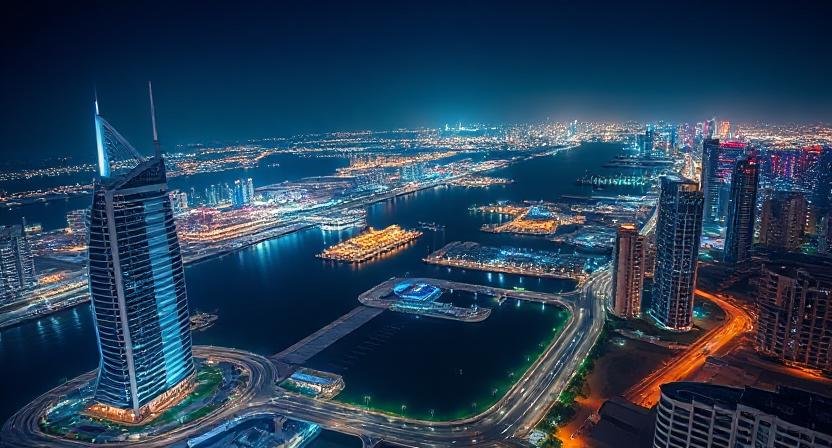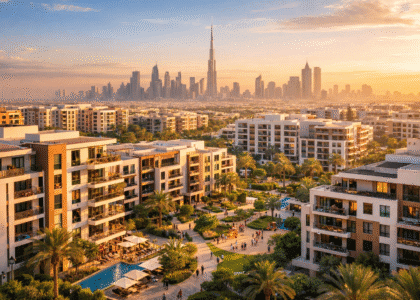Expat in UAE is an enticing option for expatriates who are thinking of buying real estate, due to a lavish lifestyle, strong infrastructure, and tax-free opportunities. Whether you’re interested in buying an apartment in Dubai Marina, or a villa for the family on Abu Dhabi’s Saadiyat Island, there are many types of property to consider as a foreign buyer.
However, there are legal, financial, and practical considerations with buying property in the UAE as an expatriate. This guide covers all of these.
1. Can Expats Buy Property in the UAE?
Yes, expats can buy property in the UAE, but only in freehold areas. Freehold areas are those designated by the government for foreigners to own. Some of the more commonly known freehold areas are:
- Dubai: Downtown, Dubai Marina, Palm Jumeirah, Jumeirah Village Circle, Business Bay
- Abu Dhabi: Al Reem Island, Yas Island, Saadiyat Island, Al Raha Beach
Freehold means you own the property and the land it was built on (meaning, you can sell it, lease it, or give it as a gift).
2. Property Ownership Types
Expatriates can generally own property through one of the two common methods:
- Freehold Ownership – Ownership of the property and land outright – only available in specified areas.
- Leasehold Ownership – You have Ownership of the property but not Ownership of the land for a define time period (generally between 30–99 years). This is found in areas that are not defined as freehold areas.
Freehold properties are usually the least risky and highest demand for expats.
3. Process of Purchasing Property in the UAE
Here is the concise process you should consider to purchase property:
Step 1: Research the Market
Understand reasonable values, prices, and locations. Obtain a registered real estate agent with knowledge of the expat market.
Step 2: Decide on Property Type
You should decide on what type of property you want:
- Off-plan property (being developed)
- Finished property (move-in ready)
The property types have advantages/disadvantages. Off-plan is less expensive, however you must wait. Finished is ready to move in!
Step 3: Finance the Property
If you are not purchasing in cash, expats should finance property through local or international banks. The banks usually offer:
- 80% finance to residents
- 25 year loan terms
Have needed documentation ready that includes your passport, visa, salary certificate, bank statements and proof of deposit in cash.
Step 4: Make an Offer and act as signee for the Memorandum of Understanding (MOU)
Once a purchase price is agreed upon, both parties shall sign the MOU and discuss the deposit (which is typically 10% of a single payment for example).
Step 5: Legal Checks and NOC
The developer shall issue to you a No Objection Certificate, NOC (which stipulates that all outstanding dues have been checked and are paid up by you) and that the developer will issue your title deed and title deed transfer will be issued subsequent to you signing for an no obstraction in a sale.
Step 6: Ownership Transfer
You will sit with your local Land Department (Dubai Land Department or Abu Dhabi Municipality), you will make your final payment and your ownership transfer will occur. You will also formally receive your title deed.
4. Costs to Take Into Account
In addition to the purchase price of the property, it is wise to expect at least the following costs:
- DLD/Transfer fee: around 4% of the property value (in Dubai)
- Agent fees: 2% of the price of the property
- NOC fee: AED 500–5,000 (exact prices vary from developer to developer)
- Mortgage Registration fee: 0.25% of the loan value
Expect to incur additional costs, as well (your likely total should be considered as at least 7–8% of the property value).
5. Residency Via Property Investment
In some emirates, you can gain a residency visa through property purchase at a specific value:
- Dubai: AED 750,000 or more, for a 3-year visa.
- AED 2 million; you qualify for Golden visa for 10 years..
This is a major draw for expats wanting at least some amount of longer term stability in the UAE.
6. Legal Considerations and Best Practices
- Be certain the real estate agent or developer is RERA approved
- If considering an off-plan purchase, also confirm that developers are registered with the Dubai Land Department or other appropriate local authority
- Eventually, read the fine print on your contract and even consider a legal advisor.
Lorem ipsum dolor sit amet, consectetur adipiscing elit. Ut elit tellus, luctus nec ullamcorper mattis, pulvinar dapibus leo.
Final Thoughts
As an expat yourself, purchasing property in the UAE is possible, and easier than ever! The UAE has lots of options, an established legal framework in place, and options for more permanent residency, so it is a strong platform to own real estate – personally and/or as investments.
Heptagon has an expertise in working with expats, making sure that they can safely, confidently, and with full information, purchase property. The process of buying property can often be overwhelming for any buyer, whether you are a first time buyer, or an experienced investor, and we can assist you at every point of the process, right through to handover.
Contact us today to start off properly with confidence on your property ownership journey in the UAE!
Follow us on Instagram and Heptagon Properties | LinkedIn





